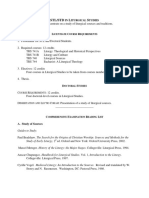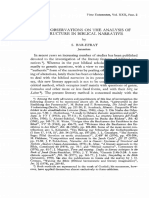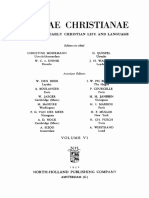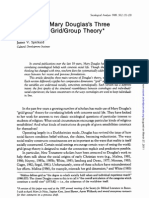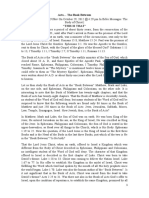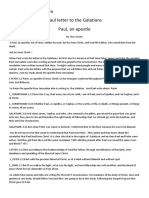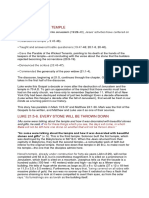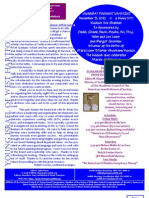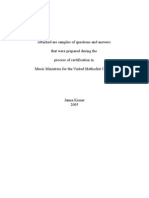0%(1)0% found this document useful (1 vote)
66 viewsMusical Theology: Past Lessons, Present Perspectives
Musical Theology: Past Lessons, Present Perspectives
Uploaded by
waldemirsouzaThis document summarizes a workshop on musical theology that explored how music shapes beliefs and how understanding the theology behind music deepens the worship experience. The workshop traced music styles from plainchant to contemporary modes and discussed how composers like Bach expressed theology musically. Participants discussed better coordinating music with scripture and other service elements. They also considered how studying church music history can help create unity within services and a church's theological traditions.
Copyright:
© All Rights Reserved
Available Formats
Download as DOC, PDF, TXT or read online from Scribd
Musical Theology: Past Lessons, Present Perspectives
Musical Theology: Past Lessons, Present Perspectives
Uploaded by
waldemirsouza0%(1)0% found this document useful (1 vote)
66 views13 pagesThis document summarizes a workshop on musical theology that explored how music shapes beliefs and how understanding the theology behind music deepens the worship experience. The workshop traced music styles from plainchant to contemporary modes and discussed how composers like Bach expressed theology musically. Participants discussed better coordinating music with scripture and other service elements. They also considered how studying church music history can help create unity within services and a church's theological traditions.
Original Title
Musical Theology
Copyright
© © All Rights Reserved
Available Formats
DOC, PDF, TXT or read online from Scribd
Share this document
Did you find this document useful?
Is this content inappropriate?
This document summarizes a workshop on musical theology that explored how music shapes beliefs and how understanding the theology behind music deepens the worship experience. The workshop traced music styles from plainchant to contemporary modes and discussed how composers like Bach expressed theology musically. Participants discussed better coordinating music with scripture and other service elements. They also considered how studying church music history can help create unity within services and a church's theological traditions.
Copyright:
© All Rights Reserved
Available Formats
Download as DOC, PDF, TXT or read online from Scribd
Download as doc, pdf, or txt
0%(1)0% found this document useful (1 vote)
66 views13 pagesMusical Theology: Past Lessons, Present Perspectives
Musical Theology: Past Lessons, Present Perspectives
Uploaded by
waldemirsouzaThis document summarizes a workshop on musical theology that explored how music shapes beliefs and how understanding the theology behind music deepens the worship experience. The workshop traced music styles from plainchant to contemporary modes and discussed how composers like Bach expressed theology musically. Participants discussed better coordinating music with scripture and other service elements. They also considered how studying church music history can help create unity within services and a church's theological traditions.
Copyright:
© All Rights Reserved
Available Formats
Download as DOC, PDF, TXT or read online from Scribd
Download as doc, pdf, or txt
You are on page 1of 13
Musical Theology: Past
lessons, present perspectives
Music shapes belief. Even people who've lost other memories or
speech often remember songs. That's why it's important to choose
worship music that fully expresses your church's theology. A
feature story exploring the importance of music theology.
By:
Joan Huyser-Honig
lic! on a photo to view this photo album.
"hen alvin ollege religion professor #ichar$ %#ic!% &lantinga
starts tal!ing about musical theology' he !nows he's up against a
plausibility structure problem. Plausibility structure' a term coine$
by sociologist &eter (erger an$ applie$ by missiologist )esslie
*ewbigin' refers to what is believable in a given culture at a given
time.
%+t's sort of a cultural pre,u$ice that theology $oesn't matter. Many
people in churches to$ay are theologically unintereste$ an$
illiterate. -o a lot of us have $erive$ our plausibility structure an$
i$entity from contemporary culture' not the hristian church an$
tra$ition'% &lantinga explains.
(ut church musicians in a wee!-long wor!shop came away
convince$ that theology $oes matter-an$ that reconnecting music
with theology can ma!e a profoun$ $i.erence. /n$erstan$ing an$
applying musical theology $eepens worshipers' experience of 0o$
an$ better prepares them to share 0o$'s "or$ in the worl$.
Look deeper
&lantinga an$ lay -chmit' a )utheran minister an$ 1uller
Theological -eminary professor' trace the sweep from
me$ieval plain chant through contemporary mo$es of worship
music' mining meaning from both notes an$ text.
%There's a gran$ tra$ition in church music that too many of us are
not in conversation with'% &lantinga says.
The wor! of Johann -ebastian (ach over2ows with examples of
how to express theology musically. (ach was )utheran' well-verse$
in Martin )uther's theology of the cross. )uther a$vise$ people to
3n$ 0o$ by loo!ing not to heaven' human reason' or spiritual
experience but to the cross' where hrist's saving act reveals our
sin an$ 0o$'s love.
(ach was cantor 4music $irector5 at -t. Thomas' a )utheran church
in )eip6ig' 0ermany' when he wrote his -t. Matthew &assion for a
0oo$ 1ri$ay service. He wrote it in the !ey of E minor' which has
one sharp. The 0erman wor$ for sharp is !reu6' which also means
cross. The 0ospel of Matthew is pac!e$ with numerical symbolism'
an$ (ach embe$$e$ biblically signi3cant numbers 4two' three' 3ve'
seven' an$ twelve5 in his score.
He also use$ music to emphasi6e !ey i$eas in the text. His notes
ascen$ for the wor$ heaven. A melisma 4multi-note$ syllable5
highlights the wor$s love' $ie' wept' an$ forever. Those $rawn out
notes help worshipers experience how 0o$'s love force$ hrist's
$eath so that sorrowfully sinful people li!e &eter' who three times
$enie$ !nowing Jesus' can live with 0o$ forever.
After a wee! of exploring similar examples' wor!shop participant
)uAnn -teiner vowe$ to pay special attention to %the theology of
hymns selecte$ for a particular service.%
-teiner' who is music assistant an$ chil$ren's choir $irector at 1irst
Mennonite hurch in (lu.ton' 7hio' a$$s' %As the songs of the
gathere$ bo$y of hrist' hymns are internali6e$ uni8uely by
worshipers. /nli!e other service music' such as organ' piano' or
choir selections' an$ unli!e the -cripture or sermon' hymns receive
their incarnation in the corporate breathing an$ singing of the faith
community.%
Are you separating music and theology?
"or!shop participants $iscusse$ the gap between the i$eal-
coor$inating music with every other service element-an$ what
really happens in local churches.
%"hen the music $oes not support the -cripture of the $ay' then it
can be viewe$ as a commo$ity whose value can too easily be
re$uce$ to '+ li!e that song' or '+ $isli!e that song.' (ut the value
an$ function of music in worship is much greater.
%"hen -cripture' visuals' music' an$ movement all wor! towar$
the service theme' there's a greater chance for worship that
praises the reator an$ nourishes an$ sustains the people'% -teiner
says.
0reg &eters' associate pastor of 1air Havens ommunity hurch in
(eaverton' 7ntario' laments music $irectors who can't recogni6e
trite or theologically unsophisticate$ songs.
%Music shoul$ be a me$ium use$ to teach !ey theological truths
an$ shoul$ be theologically acute itself. -eparating music an$
theology lea$s to the view that music is only something $one
before getting to the 'real' part of worship-the preaching of the
"or$'% he says.
Joan Averett' organist an$ music $irector at -an$ersville /nite$
Metho$ist hurch in -an$ersville' 0eorgia' explains how music
a.ects $iscipleship. -he says a $isconnect between music an$
theology results in churches that %ten$ to 'entertain' the person in
the pew rather than e8uip him for a $eeper un$erstan$ing of the
gospels. These worshipers lac! the s!ills to go out an$ proclaim the
"or$ throughout the worl$.%
Learn from the past
As!ing a church to pay more attention to musical theology may
pro$uce con2ict. (ut recogni6ing that church musicians have
struggle$ over worship issues for centuries can help congregations
put their $iscussions in perspective.
Averett says she 3n$s comfort in the controversy raise$ by the
ouncil of Trent 49:;:-9:<=5. These lea$ers charge$ that music
within the #oman atholic hurch ha$ become too lavish' was too
har$ to sing' an$ interfere$ with the liturgy.
%(ut the musicians felt the ouncil was trying to sti2e their
creativity an$ control their compositions. The
composer &alestrina was a calming force $uring this time of unrest.
His beautiful wor!s serve$ as a bri$ge'% Averett explains.
&lantinga an$ -chmit say that loo!ing into church music history
can help church musicians create three !in$s of unity-within a
given service' with a church's theological tra$ition' an$ with the
church universal.
-pea!ing of his church' )a0rave Avenue hristian #eforme$
hurch in 0ran$ #api$s' Michigan' &lantinga says' %Each service is
well crafte$' $esigne$ to ma!e a theological point. The anthem
texts an$ hymns 3t together. The postlu$e echoes the sermon
theme. A #eformation -un$ay service will li!ely inclu$e a )utheran
choral prelu$e.%
>esigning services that convey a church's theological tra$ition may
be easiest in strongly liturgical $enominations. %-ometimes the
theology is more implicit. +f you sing a lot of hymns written by
the "esleys' then as! what they wrote an$ why. &ic 7nwochei' a
participant from *igeria' explaine$ that in &entecostal churches'
theology is foun$ more in commitment to free$om an$ spontaneity
than in a bo$y of music'% &lantinga says.
Thoughtfully-chosen music can help worshipers see themselves as
members of the church of all times an$ places' or' as the *icene
ree$ puts it' %one holy catholic an$ apostolic church.% That insight
prompte$ ?eith -cherer' $irector of worship ministry at *aperville
&resbyterian hurch in *aperville' +llinois' to see that contemporary
worship music is not the only way to renewal.
%+ was $eeply move$ by how (ach expresse$ $eep theological
truths. The wor!shop remin$e$ me not to forget other streams of
renewal' such as liturgical renewal' liberation perspectives' an$ the
charismatic or &entecostal movement'% -cherer says.
-tu$ying the theology of so many music tra$itions was freeing for
)eonar$o Espinosa' a worship team lea$er an$ violinist
at ongregaci@n )e@n $e Ju$A in (oston an$ instructor at 0or$on-
onwell Theological -eminary.
%There is no one !in$ of music that exclusively 3ts worship or
conveys theology. My own posture is to be more spiritually
con3$ent' more theologically informe$' less suspicious' an$ more
a$venturous. More can be $one in composing new music arising
from a particular church's spiritual an$ theological experiences'%
Espinosa says.
Renew your worship
&lantinga' -chmit' an$ wor!shop participants $iscusse$ how
churches can use music more theologically.
&lantinga recommen$s that worship planners use a church year
calen$ar to $esign services that unite music an$ theology.
Espinosa says it's essential for musicians an$ pastors to tal! with
each other. He suggests o.ering more theological e$ucation to
musicians an$ as!ing pastors to see musicians as ministers who
communicate important worship truths. -electing suitable song
texts wor!s best when pastors an$ musicians cooperate.
As -cherer mentors volunteers who $esign an$ lea$ worship at his
church' he will focus on the concept of absolute beauty. %>oes it
existB +f so' how $o we access' name' an$ $escribe beautyB How is
it to be present in corporate worshipB% he as!s.
7f course' ,ust as the reluctantly appreciative eaters in the
3lm Babette's Feast were oblivious to all that went into their
magni3cent meal' worshipers often miss out on the rich
signi3cance of what they are $oing an$ hearing.
At ongregaci@n )e@n $e Ju$A' the pastor sometimes repeats the
wor$s of a ,ust-sung song in the sermon. 7ther times the pastor
$escribes a biblical concept' such as an attribute of 0o$' an$ then'
right $uring the sermon' as!s worshipers to ,oin in a song about
that concept or attribute. %Then people 'get it'-most of the time'%
Espinosa says.
"or!shop participants plan to use announcements in the bulletin
or before a song to explain' say' the history of a hymn tune or
scriptural reference in an instrumental piece. -ome want to o.er
church e$ucation classes on musical theology or sponsor events
that combine concerts or recitals with a brief lecture an$ time for
au$ience re2ection.
%+ hope to see a growing $ynamic in our worship that pierces to the
heart with the beauty of the )or$'% -cherer conclu$es.
Learn More
#ic! &lantinga an$ lay -chmit $eci$e$ to o.er a musical theology
seminar while wor!ing with Jeremy (egbie on a forthcoming boo!
of essays' to be publishe$ in CDDE by Eer$mans &ublishing. (egbie'
a (ritish scholar an$ musician' says that many hristians fear
music an$ emotion in worship. (ut his passion is to unite theology
an$ the arts' as he explains in this brief clip. )isten to (egbie's
summary of thin!ing theologically about arts in worship or buy his
tape$ speeches 4scroll $own to (egbie5. #ea$ his boo!s' such
as Theology, Music and Time.
0oo$ boo!s to review for your church library or $iscuss in a
fellowship' choir' or e$ucation setting inclu$eF
A Survey of Christian Hymnody by >avi$ Music an$ "ilburn
&rice 4rev. e$.5
ather into !ne" Praying and Singing lobally by . Michael
Hawn
My !nly Comfort" #eath, #eliverance, and #isci$leshi$ in the
Music of Bach by alvin -tapert
The Story of Christian Music" From regorian Chant to Blac%
os$el, an Authoritative &llustrated uide to All the Ma'or
Traditions of Music for (orshi$ by An$rew "ilson->ic!son
Ges' theology $oes matter. #ea$ this interview with )esslie
*ewbigin about plausibility structures an$ how to tal! with
someone who has a totally $i.erent set of beliefs.
*ee$ i$eas on how to explore your church's theological tra$itionB
)in! to these teaching resources about being an$ acting as
the bo$y of hrist' especially within your musically
theological tra$ition or about worship music in general.
(oo!mar! this page to see the latest music-relate$ entries in
the alvin +nstitute of hristian "orship weblog.
#ea$ (ert &olman's analysis of praise an$ worship songs an$
*icholas "olterstor.'s paper on how choirs an$ organs %crept
into% #eforme$ liturgies.
(ruce Har$ing's ana$ian Hymnology #esources &age is a treasure
trove of lin!s to many streams of hymn an$ psalm singing
tra$itions. -outhern (aptist Theological -eminary recommen$s
these worship an$ music resources.
#ea$ relate$ stories on hymn writing' choral anthems'
an$ contemporary worship music.
tart a !iscussion
"hat musical metaphors can you use to $escribe the
hristian lifeB -tart your brainstorming by thin!ing about a
chor$-perhaps how a three-note chor$ can represent the
Trinity or how in a complex chor$' many voices are hear$ but
none $ominates.
To what $egree $oes each element of your worship service 3t
with the rest to ma!e a theological pointB "hat changes
might you li!e to ma!eB "hat woul$ be the 3rst stepB
+n C orinthians 9;F9:' &aul tal!s about the value of having
someone to interpret the gift of tongues so that the whole
church is e$i3e$. "ho can help interpret music theologically
so your congregation is blesse$B
How aware is the average congregation member of your
church's theological or music tra$itionsB How might increase$
awareness $eepen worship an$ $iscipleshipB
>o the wor$s music, $raise, an$ )orshi$ all mean the same
thingB "hat new un$erstan$ings of worship an$ music woul$
help your sta. an$ congregationB
hare "our #isdom
"hat is the best way you've foun$ to help worshipers an$ music
lea$ers explore your church's musically theological tra$ition an$ go
beyon$B
>i$ you write a curriculum' perhaps with recor$e$ samples or
public songfests' to help your congregation un$erstan$ your
theological an$ musical tra$itionB
+f you've pro$uce$ a chec!list to help worship planners
integrate music with the rest of the service' have you share$
it with other churchesB
"hat have been the most 4or least5 helpful ways to let your
congregation in on the richness of the music use$ in a
particular serviceB
>i$ you 3n$ a goo$ way to involve chil$ren an$ youth in
expressing theological un$erstan$ing through musicB
httpFHHworship.calvin.e$uHresourcesHresource-libraryHmusical-theology-past-
lessons-present-perspectivesH
worship.calvin.edu http://worship.calvin.edu/resources/resource-library/musical-theology-past-lessons-
present-perspectives/
Musical Theology: Past lessons, present
perspectives
By:
Music shapes belief. Even people who've lost other memories or speech often remember
songs. That's why it's important to choose worship music that fully epresses your church's
theology. ! feature story eploring the importance of music theology.
"rint
#oan $uyser-$onig
%hen &alvin &ollege religion professor 'ichard ('ic)( "lantinga starts tal)ing about
musical theology* he )nows he's up against a plausibility structure problem. Plausibility
structure* a term coined by sociologist "eter Berger and applied by missiologist +esslie
,ewbigin* refers to what is believable in a given culture at a given time.
(-t's sort of a cultural pre.udice that theology doesn't matter. Many people in churches today
are theologically uninterested and illiterate. /o a lot of us have derived our plausibility
structure and identity from contemporary culture* not the &hristian church and tradition*(
"lantinga eplains.
But church musicians in a wee)-long wor)shop came away convinced that theology does
matter-and that reconnecting music with theology can ma)e a profound difference.
0nderstanding and applying musical theology deepens worshipers' eperience of 1od and
better prepares them to share 1od's %ord in the world.
Look deeper
"lantinga and &lay /chmit* a +utheran minister and 2uller Theological /eminary professor*
trace the sweep from medieval plain chant through contemporary modes of worship music*
mining meaning from both notes and tet.
(There's a grand tradition in church music that too many of us are not in conversation with*(
"lantinga says.
The wor) of #ohann /ebastian Bach overflows with eamples of how to epress theology
musically. Bach was +utheran* well-versed in Martin +uther's theology of the cross. +uther
advised people to find 1od by loo)ing not to heaven* human reason* or spiritual eperience
but to the cross* where &hrist's saving act reveals our sin and 1od's love.
Bach was cantor 3music director4 at /t. Thomas* a +utheran church in +eip5ig* 1ermany*
when he wrote his /t. Matthew "assion for a 1ood 2riday service. $e wrote it in the )ey of
E minor* which has one sharp. The 1erman word for sharp is )reu5* which also means
cross. The 1ospel of Matthew is pac)ed with numerical symbolism* and Bach embedded
biblically significant numbers 3two* three* five* seven* and twelve4 in his score.
$e also used music to emphasi5e )ey ideas in the tet. $is notes ascend for the word
heaven. ! melisma 3multi-noted syllable4 highlights the words love* die* wept* and forever.
Those drawn out notes help worshipers eperience how 1od's love forced &hrist's death so
that sorrowfully sinful people li)e "eter* who three times denied )nowing #esus* can live
with 1od forever.
!fter a wee) of eploring similar eamples* wor)shop participant +u!nn /teiner vowed to
pay special attention to (the theology of hymns selected for a particular service.(
/teiner* who is music assistant and children's choir director at 2irst Mennonite &hurch in
Bluffton* 6hio* adds* (!s the songs of the gathered body of &hrist* hymns are internali5ed
uni7uely by worshipers. 0nli)e other service music* such as organ* piano* or choir
selections* and unli)e the /cripture or sermon* hymns receive their incarnation in the
corporate breathing and singing of the faith community.(
Are you separating music and theology?
%or)shop participants discussed the gap between the ideal-coordinating music with every
other service element-and what really happens in local churches.
(%hen the music does not support the /cripture of the day* then it can be viewed as a
commodity whose value can too easily be reduced to '- li)e that song' or '- disli)e that song.'
But the value and function of music in worship is much greater.
1reg "eters* associate pastor of 2air $avens &ommunity &hurch in Beaverton* 6ntario*
laments music directors who can't recogni5e trite or theologically unsophisticated songs.
(Music should be a medium used to teach )ey theological truths and should be
theologically acute itself. /eparating music and theology leads to the view that music is
only something done before getting to the 'real' part of worship-the preaching of the %ord*(
he says.
#oan !verett* organist and music director at /andersville 0nited Methodist &hurch in
/andersville* 1eorgia* eplains how music affects discipleship. /he says a disconnect
between music and theology results in churches that (tend to 'entertain' the person in the
pew rather than e7uip him for a deeper understanding of the gospels. These worshipers
lac) the s)ills to go out and proclaim the %ord throughout the world.(
Learn from the past
!s)ing a church to pay more attention to musical theology may produce conflict. But
recogni5ing that church musicians have struggled over worship issues for centuries can
help congregations put their discussions in perspective.
!verett says she finds comfort in the controversy raised by the &ouncil of Trent 389:9-
89;<4. These leaders charged that music within the 'oman &atholic &hurch had become
too lavish* was too hard to sing* and interfered with the liturgy.
(But the musicians felt the &ouncil was trying to stifle their creativity and control their
compositions. The composer "alestrina was a calming force during this time of unrest.
$is beautiful wor)s served as a bridge*( !verett eplains.
"lantinga and /chmit say that loo)ing into church music history can help church musicians
create three )inds of unity-within a given service* with a church's theological tradition* and
with the church universal.
/pea)ing of his church* +a1rave !venue &hristian 'eformed &hurch in 1rand 'apids*
Michigan* "lantinga says* (Each service is well crafted* designed to ma)e a theological
point. The anthem tets and hymns fit together. The postlude echoes the sermon theme. !
'eformation /unday service will li)ely include a +utheran choral prelude.(
=esigning services that convey a church's theological tradition may be easiest in strongly
liturgical denominations. (/ometimes the theology is more implicit. -f you sing a lot of
hymns written by the %esleys* then as) what they wrote and why. "ic 6nwochei* a
participant from ,igeria* eplained that in "entecostal churches* theology is found more in
commitment to freedom and spontaneity than in a body of music*( "lantinga says.
Thoughtfully-chosen music can help worshipers see themselves as members of the church
of all times and places* or* as the ,icene &reed puts it* (one holy catholic and apostolic
church.( That insight prompted >eith /cherer* director of worship ministry at ,aperville
"resbyterian &hurch in ,aperville* -llinois* to see that contemporary worship music is not
the only way to renewal.
(- was deeply moved by how Bach epressed deep theological truths. The wor)shop
reminded me not to forget other streams of renewal* such as liturgical renewal* liberation
perspectives* and the charismatic or "entecostal movement*( /cherer says.
/tudying the theology of so many music traditions was freeing for +eonardo Espinosa* a
worship team leader and violinist at &ongregaci?n +e?n de #ud@ in Boston and instructor at
1ordon-&onwell Theological /eminary.
(There is no one )ind of music that eclusively fits worship or conveys theology. My own
posture is to be more spiritually confident* more theologically informed* less suspicious* and
more adventurous. More can be done in composing new music arising from a particular
church's spiritual and theological eperiences*( Espinosa says.
enew your worship
"lantinga* /chmit* and wor)shop participants discussed how churches can use music more
theologically.
"lantinga recommends that worship planners use a church year calendar to design
services that unite music and theology.
Espinosa says it's essential for musicians and pastors to tal) with each other. $e suggests
offering more theological education to musicians and as)ing pastors to see musicians as
ministers who communicate important worship truths. /electing suitable song tets wor)s
best when pastors and musicians cooperate.
!s /cherer mentors volunteers who design and lead worship at his church* he will focus on
the concept of absolute beauty. (=oes it eistA -f so* how do we access* name* and
describe beautyA $ow is it to be present in corporate worshipA( he as)s.
6f course* .ust as the reluctantly appreciative eaters in the film Babette's Feast were
oblivious to all that went into their magnificent meal* worshipers often miss out on the rich
significance of what they are doing and hearing.
!t &ongregaci?n +e?n de #ud@* the pastor sometimes repeats the words of a .ust-sung
song in the sermon. 6ther times the pastor describes a biblical concept* such as an
attribute of 1od* and then* right during the sermon* as)s worshipers to .oin in a song about
that concept or attribute. (Then people 'get it'-most of the time*( Espinosa says.
%or)shop participants plan to use announcements in the bulletin or before a song to
eplain* say* the history of a hymn tune or scriptural reference in an instrumental piece.
/ome want to offer church education classes on musical theology or sponsor events that
combine concerts or recitals with a brief lecture and time for audience reflection.
(- hope to see a growing dynamic in our worship that pierces to the heart with the beauty of
the +ord*( /cherer concludes.
Learn More
'ic) "lantinga and &lay /chmit decided to offer a musical theology seminar while wor)ing
with #eremy Begbie on a forthcoming boo) of essays* to be published in BCCD by Eerdmans
"ublishing. Begbie* a British scholar and musician* says that many &hristians fear
music and emotion in worship. But his passion is to unite theology and the arts* as he
eplains in this brief clip. +isten to Begbie's summary of thin)ing theologically about arts in
worship or buy his taped speeches 3scroll down to Begbie4. 'ead his boo)s* such
as Theology, Music and Time.
1ood boo)s to review for your church library or discuss in a fellowship* choir* or education
setting include:
A Survey of Christian Hymnody by =avid Music and %ilburn "rice 3rev. ed.4
ather into !ne" Praying and Singing lobally by &. Michael $awn
My !nly Comfort" #eath, #eliverance, and #isci$leshi$ in the Music of Bach by
&alvin /tapert
The Story of Christian Music" From regorian Chant to Blac% os$el, an
Authoritative &llustrated uide to All the Ma'or Traditions of Music for (orshi$ by !ndrew
%ilson-=ic)son
Ees* theology does matter. 'ead this interview with +esslie ,ewbigin about plausibility
structures and how to tal) with someone who has a totally different set of beliefs.
,eed ideas on how to eplore your church's theological traditionA
Bruce $arding's &anadian $ymnology 'esources "age is a treasure trove of lin)s to many
streams of hymn and psalm singing traditions. /outhern Baptist Theological
/eminary recommends these worship and music resources.
'ead related stories on hymn writing* choral anthems* and contemporary worship music.
!tart a "iscussion
%hat musical metaphors can you use to describe the &hristian lifeA /tart your
brainstorming by thin)ing about a chord-perhaps how a three-note chord can represent
the Trinity or how in a comple chord* many voices are heard but none dominates.
To what degree does each element of your worship service fit with the rest to ma)e
a theological pointA %hat changes might you li)e to ma)eA %hat would be the first stepA
-n B &orinthians 8::89* "aul tal)s about the value of having someone to interpret
the gift of tongues so that the whole church is edified. %ho can help interpret music
theologically so your congregation is blessedA
$ow aware is the average congregation member of your church's theological or
music traditionsA $ow might increased awareness deepen worship and discipleshipA
=o the words music, $raise, and )orshi$ all mean the same thingA %hat new
understandings of worship and music would help your staff and congregationA
!hare #our $isdom
%hat is the best way you've found to help worshipers and music leaders eplore your
church's musically theological tradition and go beyondA
=id you write a curriculum* perhaps with recorded samples or public songfests* to
help your congregation understand your theological and musical traditionA
-f you've produced a chec)list to help worship planners integrate music with the rest
of the service* have you shared it with other churchesA
%hat have been the most 3or least4 helpful ways to let your congregation in on the
richness of the music used in a particular serviceA
=id you find a good way to involve children and youth in epressing theological
understanding through musicA
"ublished:
!ugust C9* BCC9
'esource Type:
2eature /tory
&ategory:
Music* %orship- "lanning
Tas):
2ind or write music* 2ind or start a discussion
Tags:
Theology
%omments
You might also like
- Retractions in ST AugustineDocument6 pagesRetractions in ST AugustinebrofidelmaserekavcNo ratings yet
- Sacramental Theology (Vorgrimler, Herbert) (Z-Library)Document341 pagesSacramental Theology (Vorgrimler, Herbert) (Z-Library)Henrique Kojin100% (1)
- Josef PieperDocument7 pagesJosef PieperiscaNo ratings yet
- STL - Lit - Reading ListDocument3 pagesSTL - Lit - Reading ListmarkopranicNo ratings yet
- Latinisms in MarkDocument2 pagesLatinisms in MarkwaldemirsouzaNo ratings yet
- Inner AwakeningDocument109 pagesInner Awakeningscribdvbp100% (3)
- Daily Procedure For Every "Psychiana" Student by Frank B RobinsonDocument1 pageDaily Procedure For Every "Psychiana" Student by Frank B Robinsonhanako1192100% (1)
- BychkovDocument2 pagesBychkovAndreas Pratama NugrahaNo ratings yet
- John Calvin and Late Mediaeval ThoughtDocument21 pagesJohn Calvin and Late Mediaeval Thoughtalma moraNo ratings yet
- The Quotation From Isaiah 42.1-4 in Matthew 12.18-21 - J. J. MenkenDocument18 pagesThe Quotation From Isaiah 42.1-4 in Matthew 12.18-21 - J. J. MenkenRicardo Santos SouzaNo ratings yet
- Redeeming Creation Creatio Ex Nihilo andDocument27 pagesRedeeming Creation Creatio Ex Nihilo andluismendoza1No ratings yet
- DZ Phillips On The Grammar of GodDocument16 pagesDZ Phillips On The Grammar of GodEugene SalazarNo ratings yet
- Intro To ST Bonaventure, Collations On The Decalogue PDFDocument16 pagesIntro To ST Bonaventure, Collations On The Decalogue PDFVictorNo ratings yet
- Augustine Sermons 306 340Document354 pagesAugustine Sermons 306 340Dejmien23No ratings yet
- Douglas Campbell, Pistis-Christou in Rom 1-17Document22 pagesDouglas Campbell, Pistis-Christou in Rom 1-17robert guimaraesNo ratings yet
- Bibliografie (Sinteza) DionisieDocument6 pagesBibliografie (Sinteza) DionisieprofsimaNo ratings yet
- 1 John 2.12-14 As Distributio, Conduplicatio, and Expolitio - A Rhetorical UnderstandingDocument14 pages1 John 2.12-14 As Distributio, Conduplicatio, and Expolitio - A Rhetorical UnderstandingRicardo Santos SouzaNo ratings yet
- Some Observations On The Analysis of Structure in Biblical NarrativeDocument20 pagesSome Observations On The Analysis of Structure in Biblical NarrativeRicardo Santos SouzaNo ratings yet
- The Enrichment of God in Balthasar's Trinitarian EschatologyDocument16 pagesThe Enrichment of God in Balthasar's Trinitarian EschatologyFady ABDELNOURNo ratings yet
- Response To James Watkins' "Creativity As Sacrifice," by Jeremy S. BegbieDocument3 pagesResponse To James Watkins' "Creativity As Sacrifice," by Jeremy S. BegbieImaginatioRatioNo ratings yet
- Olevianus and The Authorship of The Heidelberg Catechism - Lyle BiermaDocument12 pagesOlevianus and The Authorship of The Heidelberg Catechism - Lyle BiermaRobert LotzerNo ratings yet
- We Believe in One God (Gerald L. Bray) (Z-Library)Document201 pagesWe Believe in One God (Gerald L. Bray) (Z-Library)AndersonNo ratings yet
- Retrieving Nicaea The Development and MeDocument2 pagesRetrieving Nicaea The Development and MeCristhofer JP Sullo100% (1)
- Descartes Voetius Anals PDFDocument15 pagesDescartes Voetius Anals PDFVadana Mihai-DragosNo ratings yet
- Peter Abelard - An Exposition On The Six-Day Work (Corpus Christianorum in Translation)Document132 pagesPeter Abelard - An Exposition On The Six-Day Work (Corpus Christianorum in Translation)Marcus Adonai Castro da SilvaNo ratings yet
- MagnanimityDocument3 pagesMagnanimitySukhdeep SadeoraNo ratings yet
- 281 Graham David A 201311 MA Thesis PDFDocument95 pages281 Graham David A 201311 MA Thesis PDFNica Marius100% (1)
- Indicative and Imperative in Matthean SoteriologyDocument25 pagesIndicative and Imperative in Matthean SoteriologyRicardo Santos SouzaNo ratings yet
- The Cappadocian Distinction Between Person and Nature and Its ImpDocument11 pagesThe Cappadocian Distinction Between Person and Nature and Its ImpCornel-Georgian DinicăNo ratings yet
- More Splendid Than The Sun Christs Fles PDFDocument20 pagesMore Splendid Than The Sun Christs Fles PDFnanukNo ratings yet
- Ecclesiastical HistoryDocument559 pagesEcclesiastical Historypurgarboris100% (1)
- Vlachos, Law, Sin and DeathDocument22 pagesVlachos, Law, Sin and DeathJohnNo ratings yet
- Peace of GodDocument27 pagesPeace of GodAndrei LeconaNo ratings yet
- 1978 - John P. Meier - Review of What Is A Gospel. The Genre of The Canonical Gospels' by Charles H. TalbertDocument3 pages1978 - John P. Meier - Review of What Is A Gospel. The Genre of The Canonical Gospels' by Charles H. Talbertbuster301168No ratings yet
- Theosis: Orthodox SoteriologyDocument17 pagesTheosis: Orthodox SoteriologyRev BalanNo ratings yet
- CPPS Heritage II Community Mission Spirituality - FinalDocument368 pagesCPPS Heritage II Community Mission Spirituality - FinalPrecious Blood Spirituality100% (1)
- Augustine's Account of Evil As Privation of GoodDocument13 pagesAugustine's Account of Evil As Privation of GoodPhilip Can Kheng Hong100% (4)
- The Populus of Augustine and Jerome A Study in The Patristic Se PDFDocument296 pagesThe Populus of Augustine and Jerome A Study in The Patristic Se PDFManticora 1120100% (1)
- Scinditur in Partes Populus: Pope Damasus and The Martyrs of RomeDocument15 pagesScinditur in Partes Populus: Pope Damasus and The Martyrs of RomeMihaela LemnaruNo ratings yet
- Reading List PDFDocument4 pagesReading List PDFmarkopranicNo ratings yet
- 12 Calvin and SoulDocument19 pages12 Calvin and SoulWon-jin KimNo ratings yet
- Out of The Cloister. Scholastic Exegesis of The Song of Songs, 1100-1250 - Suzanne LaVere (Brill, Leiden 2016)Document202 pagesOut of The Cloister. Scholastic Exegesis of The Song of Songs, 1100-1250 - Suzanne LaVere (Brill, Leiden 2016)Medieval AsesoríasNo ratings yet
- Gerald P Bonner Augustine ParticipationDocument19 pagesGerald P Bonner Augustine ParticipationGabriel Straube100% (1)
- A Study of Luke's Ethics of Wealth, Poverty, and ReversalDocument12 pagesA Study of Luke's Ethics of Wealth, Poverty, and ReversalRicardo Santos SouzaNo ratings yet
- Vigiliae Christianae 06 1952Document261 pagesVigiliae Christianae 06 1952Alexandru MadgearuNo ratings yet
- McGUCKIN John - Orthodox Monasticism Past and Present (2015)Document600 pagesMcGUCKIN John - Orthodox Monasticism Past and Present (2015)Georges Grigo100% (2)
- Augustine of Hippos Trinitarian Imago de PDFDocument16 pagesAugustine of Hippos Trinitarian Imago de PDFMads Peter Karlsen100% (1)
- Barr, David - The Apocalypse of John As Oral EnactmentDocument14 pagesBarr, David - The Apocalypse of John As Oral EnactmentJuan Alberto Casas100% (2)
- The Implied Reader of Luke's GospelDocument9 pagesThe Implied Reader of Luke's GospelRicardo Santos SouzaNo ratings yet
- Bull, Burton, Grabe. Defensio Fidei Nicaenae. 1851. Volume 1.Document396 pagesBull, Burton, Grabe. Defensio Fidei Nicaenae. 1851. Volume 1.Patrologia Latina, Graeca et OrientalisNo ratings yet
- SHCT 175 Smith - The Ten Commandments - Interpreting The Bible in The Medieval World 2014 PDFDocument249 pagesSHCT 175 Smith - The Ten Commandments - Interpreting The Bible in The Medieval World 2014 PDFL'uomo della RinascitáNo ratings yet
- Scrinium Augustini: The World of Augustine'S LettersDocument51 pagesScrinium Augustini: The World of Augustine'S LetterssalomeNo ratings yet
- Aristotle's Great-Souled ManDocument31 pagesAristotle's Great-Souled ManDaniel PerroneNo ratings yet
- Octavius Winslow Titles of Christ PDFDocument113 pagesOctavius Winslow Titles of Christ PDFENIOLA TOSIN100% (1)
- A Guide To Mary Douglas's Three Versions of Grid-Group TheoryDocument20 pagesA Guide To Mary Douglas's Three Versions of Grid-Group Theorylilltroll2No ratings yet
- The Course of The Donatist Schism in LatDocument41 pagesThe Course of The Donatist Schism in LatjthandiekkalNo ratings yet
- Emile Brehier: (Presidential Address)Document15 pagesEmile Brehier: (Presidential Address)DavidAWWNo ratings yet
- Koinqnia and Its Cognates in The New TestamentDocument31 pagesKoinqnia and Its Cognates in The New TestamentRafael MediavillaNo ratings yet
- Manton Thomas Volume 09Document274 pagesManton Thomas Volume 09SETICROS OficialNo ratings yet
- Migne. Patrologiae Cursus Completus: Series Latina. 1800. Volume 30.Document556 pagesMigne. Patrologiae Cursus Completus: Series Latina. 1800. Volume 30.Patrologia Latina, Graeca et Orientalis100% (1)
- Luther on Faith and Love: Christ and the Law in the 1535 Galatians CommentaryFrom EverandLuther on Faith and Love: Christ and the Law in the 1535 Galatians CommentaryNo ratings yet
- Engaging Ecclesiology: Papers from the Edinburgh Dogmatics Conference 2021From EverandEngaging Ecclesiology: Papers from the Edinburgh Dogmatics Conference 2021No ratings yet
- The Epistle of James: Return To IndexDocument12 pagesThe Epistle of James: Return To IndexwaldemirsouzaNo ratings yet
- A Dispensational Synopsis of The New TestamentBakerI06Document151 pagesA Dispensational Synopsis of The New TestamentBakerI06waldemirsouzaNo ratings yet
- ©2021 Shalom Scripture Studies, IncDocument1 page©2021 Shalom Scripture Studies, IncwaldemirsouzaNo ratings yet
- Acts The Book BetweenDocument8 pagesActs The Book BetweenwaldemirsouzaNo ratings yet
- Hebrews 02Document1 pageHebrews 02waldemirsouzaNo ratings yet
- GALATAS - 01 - Paul The ApostleDocument3 pagesGALATAS - 01 - Paul The ApostlewaldemirsouzaNo ratings yet
- Bible Lesson Book Number TwoDocument76 pagesBible Lesson Book Number TwowaldemirsouzaNo ratings yet
- April Searchlight 2017 WebsiteDocument32 pagesApril Searchlight 2017 WebsitewaldemirsouzaNo ratings yet
- Challenge To Fundamentalists ADocument15 pagesChallenge To Fundamentalists AwaldemirsouzaNo ratings yet
- Olivet PPDocument2 pagesOlivet PPwaldemirsouzaNo ratings yet
- B E I R: Iblical Vidence For The Mminence of The AptureDocument15 pagesB E I R: Iblical Vidence For The Mminence of The ApturewaldemirsouzaNo ratings yet
- Hand Over ReportDocument3 pagesHand Over ReportTolulope AfolayanNo ratings yet
- Exegesis:: Luke 19-21. in The TempleDocument14 pagesExegesis:: Luke 19-21. in The TempleVincent De VeraNo ratings yet
- God Created All Things, (World and The Human Persons) - They Were in "Paradise"Document68 pagesGod Created All Things, (World and The Human Persons) - They Were in "Paradise"Ell VNo ratings yet
- (Texts and Editions For New Testament Study 11) Simon Gathercole - The Gospel of Thomas - Introduction and Commentary-Brill Academic Publishers (2014) PDFDocument738 pages(Texts and Editions For New Testament Study 11) Simon Gathercole - The Gospel of Thomas - Introduction and Commentary-Brill Academic Publishers (2014) PDFMarcia Eloi Rodrigues100% (5)
- Holy RudrakshaDocument28 pagesHoly RudrakshakunkumabalaNo ratings yet
- TertulianDocument2 pagesTertulianRichmon Rey JundisNo ratings yet
- Christian Living Exam For Grade 5Document2 pagesChristian Living Exam For Grade 5Leah Mae Open AlquizarNo ratings yet
- Jacobite Calendar 2012Document12 pagesJacobite Calendar 2012JobinNo ratings yet
- CBCP Monitor Vol. 17 No. 22 PDFDocument20 pagesCBCP Monitor Vol. 17 No. 22 PDFAreopagus Communications, Inc.No ratings yet
- DuginDocument32 pagesDuginPyotr Wrangel100% (1)
- Art & Culture of IndiaDocument32 pagesArt & Culture of IndiaGyana Ranjan LenkaNo ratings yet
- CLARKE, Samuel, A Discourse Concerning The Being and Attributes of GodDocument536 pagesCLARKE, Samuel, A Discourse Concerning The Being and Attributes of GodJean BenoitNo ratings yet
- KierkegaardDocument14 pagesKierkegaardNiloIbarraNo ratings yet
- Wicklow Rathdrum Avoca Arklow: Monday To Saturday SundayDocument3 pagesWicklow Rathdrum Avoca Arklow: Monday To Saturday SundayBogdan RosculetNo ratings yet
- Hebrew 丁道爾聖經註釋Document201 pagesHebrew 丁道爾聖經註釋kyyeungNo ratings yet
- Exegesis Hebrews 6 - 1 8Document12 pagesExegesis Hebrews 6 - 1 8C.R. Brown100% (1)
- HIST - Retraction of RizalDocument66 pagesHIST - Retraction of RizalJavier JeremiaNo ratings yet
- Druidismo Britanico-PAUL DAVIESDocument113 pagesDruidismo Britanico-PAUL DAVIESIolair FaolNo ratings yet
- Perpetual NovenaDocument20 pagesPerpetual NovenaJomin TomyNo ratings yet
- Activity: "Growing in Kindness" Caterpillar (Black and White)Document6 pagesActivity: "Growing in Kindness" Caterpillar (Black and White)MyWonderStudio100% (1)
- Shabbat Parshat Vayetzei: Both of His LecturesDocument7 pagesShabbat Parshat Vayetzei: Both of His LecturesjtpatelNo ratings yet
- January 15, 2015 Arrival of Pope FrancisDocument9 pagesJanuary 15, 2015 Arrival of Pope FrancisZamora Enguerra EmmalyneNo ratings yet
- Abdul KalamDocument3 pagesAbdul Kalamविवेक शर्माNo ratings yet
- Music Ministry Statement 2005Document4 pagesMusic Ministry Statement 2005jlkisnerNo ratings yet
- Black History Sermon February 20 2011Document8 pagesBlack History Sermon February 20 2011Marcus McElhaneyNo ratings yet
- VinitaDocument11 pagesVinitarajamohanr78No ratings yet
- Las Reglas CongasDocument2 pagesLas Reglas Congashugomath100% (1)
- James: The Author and The EpistleDocument5 pagesJames: The Author and The EpistleJames PeetNo ratings yet



